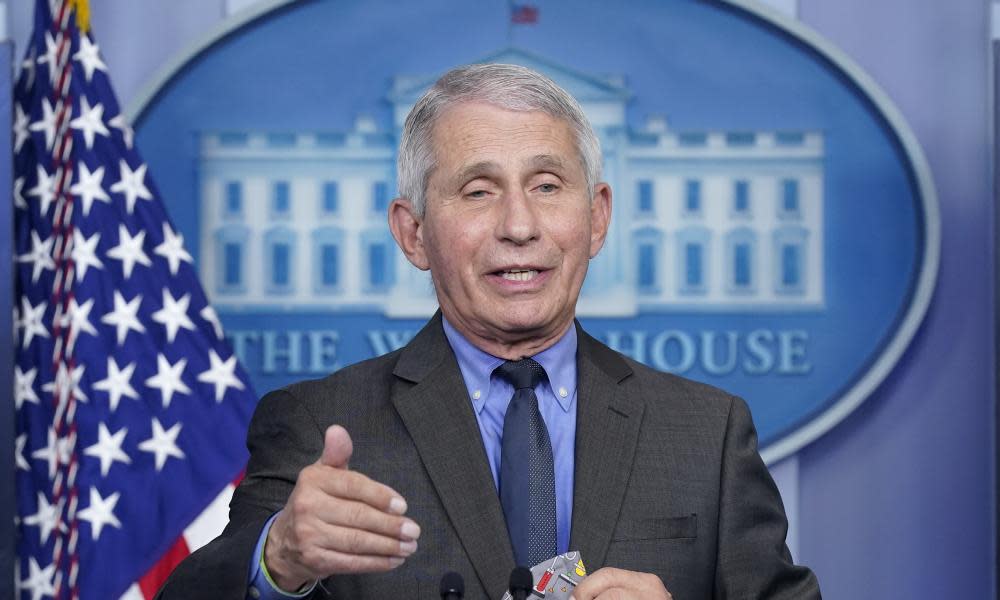Australia should make Covid vaccine rollout ‘top priority’, Anthony Fauci says

Covid vaccination must be “top priority” and allocated significant resources, the chief medical adviser to the White House, Dr Anthony Fauci, has said when asked what Australia could learn from the US rollout.
So far in the US, more than 35% of the population has received their first dose since the program began in December. In Australia, just 1.3m doses have been administered.
“What president [Joe] Biden did is that he made it the very, very top priority,” Fauci said. “What he’s done, for example, is open up community vaccine centres, get vaccines to the pharmacies, develop mobile units to go out to get the people who are in poorly accessible areas, and got people who would be administering the vaccine out into the field as fast as he could.
“Those are retired physicians, military personnel, nurses, medical students, as many people as you possibly can to get out there and administer it. So it was really making it the highest priority to get vaccine into people’s arms – and it works.”
Related: ‘Sense of urgency’: premiers demand more Covid-19 vaccine information from Scott Morrison
The US on Monday performed a record 4.6m vaccinations in a single day. As of 12 April, about 57 vaccination doses had been administered for every 100 people in the US population.
“If we keep doing that over the next few months I believe we will finally get the overwhelming majority of the people vaccinated, which I hope will then turn things around and get that level of daily infections down to a manageable level,” Fauci said.
Fauci made the comments during the inaugural David Cooper Lecture for the Kirby Institute at the University of NSW. It was pre-recorded on Tuesday and broadcast on Wednesday night.
Cooper was an Australian HIV/Aids researcher and immunologist and former director of the Kirby Institute who, along with Prof Ron Penny, diagnosed the first case of HIV in Australia. Cooper, died in 2018, but he and Fauciwere friends, and they were both integral to early HIV research and control in their respective countries.
Fauci said a potential “stumbling block” in the US rollout was a significant level of vaccine hesitancy. A study published in the Journal of Community Health earlier in April found in the US, vaccine hesitancy was higher among African Americans (34%), Hispanics (29%), those who had children at home (25%), rural dwellers (29%), people in the north-eastern US (25%) and those who identified as Republicans (29%).
Vaccine hesitancy was predicted significantly by sex, education, employment, income, having children at home, and political affiliation, the study found.
“The issue is, we’ve got to get the overwhelming majority of the population vaccinated,” Fauci said.
“We have people who don’t want to get vaccinated for reasons that don’t seem to have anything to do with public health. It’s unjustified skepticism, it’s a political ideology.
“I mean, how could it be that a certain proportion of people of a particular persuasion don’t want to get vaccinated? That just doesn’t make any sense.”
default
He said hesitancy from the African American community and other minorities was understandable given their history of mistreatment and injustice including during federal medical initiatives. But changing the minds of those who were hesitant because of political allegiances was more difficult, he said.
“It really is a complication of an anti-science atmosphere that has evolved with a certain type of political persuasion … when you have a terrible pandemic looking you straight in the eye, you know, in some respects it is almost inexplicable, but unfortunately it’s happening.
“So although I would love to, and do, extend myself with a substantial investment of time to [encourage people to] get vaccinated, the hardcore ones that don’t want to for political reasons, I don’t think I could change their mind.”

 Yahoo News
Yahoo News 
